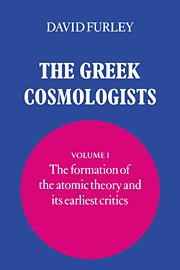Book contents
- Frontmatter
- Contents
- Preface
- 1 Two pictures of the world
- 2 The judgement of Socrates
- 3 The beginning in Miletus
- 4 Two philosophical critics: Heraclitus and Parmenides
- 5 Pythagoras, Parmenides, and later cosmology
- 6 Anaxagoras
- 7 Empedocles and the invention of elements
- 8 Later Eleatic critics
- 9 Leucippus and Democritus
- 10 The cosmos of the Atomists
- 11 The anthropology of the Atomists
- 12 Plato's criticisms of the materialists
- 13 Aristotle's criticisms of the materialists
- Bibliography
- Index of passages
- General index
13 - Aristotle's criticisms of the materialists
Published online by Cambridge University Press: 27 January 2010
- Frontmatter
- Contents
- Preface
- 1 Two pictures of the world
- 2 The judgement of Socrates
- 3 The beginning in Miletus
- 4 Two philosophical critics: Heraclitus and Parmenides
- 5 Pythagoras, Parmenides, and later cosmology
- 6 Anaxagoras
- 7 Empedocles and the invention of elements
- 8 Later Eleatic critics
- 9 Leucippus and Democritus
- 10 The cosmos of the Atomists
- 11 The anthropology of the Atomists
- 12 Plato's criticisms of the materialists
- 13 Aristotle's criticisms of the materialists
- Bibliography
- Index of passages
- General index
Summary
Aristotle vigorously attacked the Atomists and their predecessors for their theories of the elementary material components of the physical world. He himself held a theory that there are such elements, but it differed from all that had come before: he does not even spare Empedocles, who anticipated him at least in picking out earth, water, air, and fire as the elements. His criticisms are directed at the character given to the elements, and the use made of these elements in explaining the phenomena.
We shall examine these criticisms of early theories of the material elements in the second section. First, we must look at a more fundamental criticism – a criticism of materialism itself. Aristotle argues that an account of the material elements is a necessary part of explanation in the study of the natural world, but it is not sufficient for explanation, except in a minority of less important cases. He accuses his philosophical predecessors of a crucial failure, in that they virtually ignored form and finality in nature. This takes us right to the heart of the differences between Atomism and Aristotelianism.
The failure of Presocratic explanations
The subject under discussion is nature, physis. At the beginning of the second book of his Physics, Aristotle makes some very general remarks, which then form the basis for his criticisms of the Presocratics.
- Type
- Chapter
- Information
- The Greek Cosmologists , pp. 177 - 200Publisher: Cambridge University PressPrint publication year: 1987



